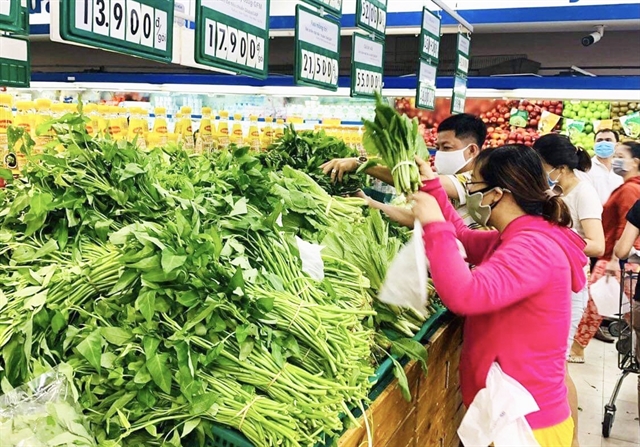 Economy
Economy

HCM City authorities have demanded that supermarkets and convenience stores take preventive measures to handle essential goods reselling at much higher prices, causing a supply shortage at supermarkets.

|
| People shop at a supermarket in HCM City. City authorities have asked distribution systems to ensure supply of food during the lockdown period. VNA/VNS Photo Hoàng Tuyết |
HCM CITY — HCM City authorities have demanded that supermarkets and convenience stores take preventive measures to handle essential goods reselling at much higher prices, causing a supply shortage at supermarkets.
Dương Anh Đức, vice chairman of the People’s Committee, said: “City authorities have asked distribution systems to ensure daily capacity of more than 5,000 tonnes of fresh food and 6,000 tonnes of vegetables and fruits to meet demand for people’s daily life.”
The move came as local media have reported that speculators took advantage of the pandemic to buy goods in bulk and then resell them at sky-high prices.
Customers said they had been queuing for a long time to buy food such as vegetables, meat and fish and other essential supplies at supermarkets and convenience stores. Much of the food was being sold at higher prices.
Meanwhile, customers who buy goods in bulk explained they wanted to buy enough for a whole week to limit their travels for fear of catching the virus.
According to Saigon Co.op (Union of Commercial Cooperatives of HCM City), violators are taking advantage of the price-stabilisation policies at Saigon Co.op to buy goods in bulk, causing essential goods to sell out quickly.
For example, under price-stabilisation policies at Saigon Co.op, the price remains low, at VNĐ26,000 per package of 10 chicken eggs and VNĐ31,000 per package of 10 duck eggs, about VNĐ10,000-15,000 lower than market price.
To prevent speculation, supermarkets and stores of Saigon Co.op have applied the rule that each customer can only buy one or two packages of eggs to ensure enough supply for “customers who come later”.
According to a representative of MM Mega Market, there is “really no shortage of goods”, but there are customers buying in large quantities.
“With a huge stockpile, the supermarket has no shortage of food, especially poultry eggs. Customers should not stock up at the moment since the supermarket remains open to serve,” said a representative of MM Mega Market.
Satra supermarkets and Satrafoods store systems said they do not have any priority policy, so it is easy to notice speculation buyers.
Lawyer Phan Thị Viết Thu, chairman of the HCM City Consumer Protection Association, said: “Speculation of essential goods for reselling at high prices is a speculative act of profiteering, which will be sanctioned under Article 31 of Decree 98/2020 with a fine of VNĐ5-100 million.”
“It can be criminally prosecuted for the crime of speculation under Article 196 of the Penal Code 2015. Depending on the value of the orders, violators will be subject to a maximum of 15 years in prison in case of illegal profits of over VNĐ1 billion.”
City ensures shipment of goods
The city government has established shipment points to ensure circulation of goods to retail systems because all three wholesale markets have been temporarily closed.
The Thủ Đức wholesale market has set up a 16,500sq.m area to receive goods to ship to retailers in the city.
Each night, 1,000-1,500 tonnes of vegetables and fruits are expected to be supplied to supermarkets and selling places in the city.
Hóc Môn wholesale market said it had submitted a plan to the Department of Industry and Trade and the People’s Committee to partially reopen the market.
The market will arrange an area of more than 2,000sq.m to ship more than 100 tonnes of vegetables and fruits from the market to retailers in the city every day.
Nguyễn Nguyên Phương, deputy director of the Department of Industry and Trade, said the amount of food delivered to HCM City in a day reached about 1,900 tonnes in a day, an increase of 100 tonnes compared to July 12.
According to the Department of Industry and Trade, 166 traditional markets had stopped operating, which greatly affected the supply of goods to people, mainly fresh food.
The department has set up a force to monitor the situation of market prices and coordinate and supply goods in a timely manner.
Trần Quang Lâm, director of the Department of Transport, said the city has coordinated with 19 southern provinces to facilitate nearly 22,000 vehicles to pass the checkpoints at city gateways.
Dương Anh Đức, vice chairman of the People’s Committee, has announced that there are 2,833 points of sale distributed widely in 22 districts and Thủ Đức City, including 106 supermarkets, 2,616 mini-marts and convenience stores, 111 safe traditional markets, and 28,700 department stores.
City considers reopening traditional markets
The Department of Industry and Trade has asked districts and Thủ Đức City authorities to consider reopening traditional markets to reopen those that are safe to meet demand.
Only 63 out of 234 traditional markets are still operating in HCM City due to the outbreak.
The city will pilot a plan in which only two to 10 small traders of fruit and vegetables (depending on the size of the market’s operation) will sell at traditional markets or take turns if many small businesses want to reopen at the same time.
The city will also work to control the number of people going to the market.
Recently, there were rumours on social media that there would be a complete citywide lockdown, along with calls for city residents to start stockpiling food and supplies.
Food scarcity and shortages were also rumoured to be imminent as well as a ban on shopping starting July 15. Several posts also rumoured that city leaders had contracted the deadly virus.
Such groundless rumours have urged many people to rush to supermarkets and convenience stores to buy supplies.
HCM City authorities have officially refuted the rumours.
The city has recorded nearly 20,000 locally transmitted cases since the outbreak began in late April. — VNS




